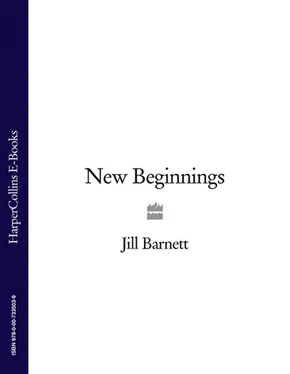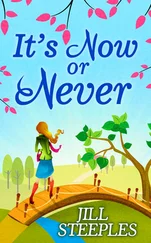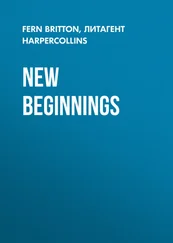JILL BARNETT
New Beginnings
This novel is entirely a work of fiction.
The names, characters and incidents portrayed in it are the work of the author’s imagination. Any resemblance to actual persons, living or dead, events or localities is entirely coincidental.
AVON
A division of HarperCollins Publishers Ltd. 1 London Bridge Street, London SE1 9GF
www.harpercollins.co.uk
Copyright © Jill Barnett 2008
Jill Barnett asserts the moral right to be identified as the author of this work
A catalogue record for this book is available from the British Library
All rights reserved under International and Pan-American Copyright Conventions. By payment of the required fees, you have been granted the non-exclusive, non-transferable right to access and read the text of this ebook on-screen. No part of this text may be reproduced, transmitted, down-loaded, decompiled, reverse engineered, or stored in or introduced into any information storage and retrieval system, in any form or by any means, whether electronic or mechanical, now known or hereinafter invented, without the express written permission of HarperCollins ebooks
HarperCollins Publishers has made every reasonable effort to ensure that any picture content and written content in this ebook has been included or removed in accordance with the contractual and technological constraints in operation at the time of publication
Source ISBN: 9781847560254
Ebook Edition © 2008 ISBN: 9780007335039
Version: 2018-06-19
March is not us, nor are her experiences ours. This story is fiction. But we know her world, because we have traveled down the same kind of unfamiliar, muddied roads, because we had to overcome the past to find a future, because of this and so much more, New Beginnings is for Jane, Meryl, Cathy, JJ, Deb, and me.
What is this really like? Never mind the conventions and the decisions we’ve all made together. What is it really like?
Mike Nichols, Inside the Actor’s Studio
Title Page
Copyright
Part One
Chapter One
Chapter Two
Chapter Three
Chapter Four
Chapter Five
Chapter Six
Chapter Seven
Chapter Eight
Part Two
March
Chapter Nine
Chapter Ten
Chapter Eleven
Chapter Twelve
Chapter Thirteen
Chapter Fourteen
Chapter Fifteen
Chapter Sixteen
Chapter Seventeen
Chapter Eighteen
Part Three
Chapter Nineteen
Chapter Twenty
Chapter Twenty-one
Chapter Twenty-two
Chapter Twenty-three
Chapter Twenty-four
Chapter Twenty-five
Chapter Twenty-six
Chapter Twenty-seven
Chapter Twenty-eight
Chapter Twenty-nine
Chapter Thirty
Chapter Thirty-one
Chapter Thirty-two
Epilogue
Top Winter Destinations
A Winter’s Tale
About the Author
By the same author:
About the Publisher
San Francisco is a mad city—inhabited for the most part by perfectly insane people whose women are of a remarkable beauty.
Rudyard Kipling
March Randolph Cantrell was named for the time of year she came into the world, and had lived all of her life in a golden state. The Golden State exists deep in the bones and blood of those born there, and makes them different, natural to the land with all its mysteries and quirks. Native Californians are immanent beings who can recognize instinctively the color and stillness of earthquake weather, and are never divided by that invisible latitude/attitude that separates Northern from Southern; they understand the human geography of one whose first breath of air was in a land of gold rushes, gold hillsides and golden bridges.
A native can stand on the sandy spot where the biggest and deepest blue ocean in the world touches land and know there are more hungry sharks behind them than in front of them.
Birthright gives them ownership in the fables of California, those Disneyesque stories of El Dorado and Father Junipero Serra, who once sowed a magical trail of mustard seeds as he walked the length of the land, on leather sandals coated with brown soil in which almost anything could grow.
Come every spring, Father Serra’s yellow mustard seeds sprout up from the ground on rolling hillsides, around fresh asphalt—in spite of concrete and wood frames—as bright a gold in color as one could imagine, and there to remind those who care to notice of the way things once were.
The month of March is a time of lions and lambs, and, in California, the time of the four-leafed mustard blooms that some claim are luckier than clover, and certainly more resilient. No matter what the weather: freak snow and ice, brush fires, crackling drought or Pineapple-Express-rains that drive homes down crumbling hillsides, despite all that Mother Nature can cast down from the heavens, every year the mustard always grows back.
For March Randolph Cantrell, California native was just one of many things that defined her: woman, daughter, artist, wife, mother, friend, businesswoman, now grandmother, a title that sounded too decrepit for a baby boomer who still wore string-bikini underwear and listened to rock music.
Growing up on the West Coast in the 1950’s, March and her sister May were known as those Randolph girls with the strange springtime names. Back in Connecticut, where the Randolph family had deep roots, names like March and May were simple tradition, appropriate as Birch and Rebecca, and not uncommon to girls with a great aunt named Hester, who had pointed out during one family holiday, “California is a fine place to live if you happen to be an orange.”
One bright blue day when March was eight, someone called the Randolph girls California natives. So with the peacock feathers from her mother’s vase sticking out of her ponytail, March stood at the medicine cabinet mirror and war-painted her face with blue and white tempera paint left over from vacation Bible school.
For those few weeks during an incalescent and sullen August, she ran around with a rubber Cochise tomahawk tucked into the waist of her seersucker shorts, speaking to everyone in bad Indian dialogue from an old black and white western.
At night, in those deep, still, blue hours when girls might lie in bed with secret thoughts of silly crushes and dreams of some-day-grown-up lives, her dreams weren’t about the neighborhood boy who let her ride his new Schwinn bicycle with the baseball cards clothes-pinned to the spokes, who loaned her the rubber tomahawk and wore his hair in a flat top. She dreamed that she was inside the wild stories that came from their small-screen TV—topped with tall rabbit ear antenna (which sometimes worked better if you put a piece of aluminum foil on them).
While her sister May had a passion for movies and heart throbs like Tab Hunter and James Dean, March demanded more from her television heroes and dreamt about falling in love with someone like Cochise, a noble man with a big dream. That was 1958. Ten years later, she met him.
A year after the Summer of Love, 1968 was filled with youthful dreamers fast becoming disillusioned. The sweet legacy of Haight had suddenly become hate. San Francisco, like most of the country, reeled from shock and the frightening belief that the world was rotting from the inside out.
Читать дальше












